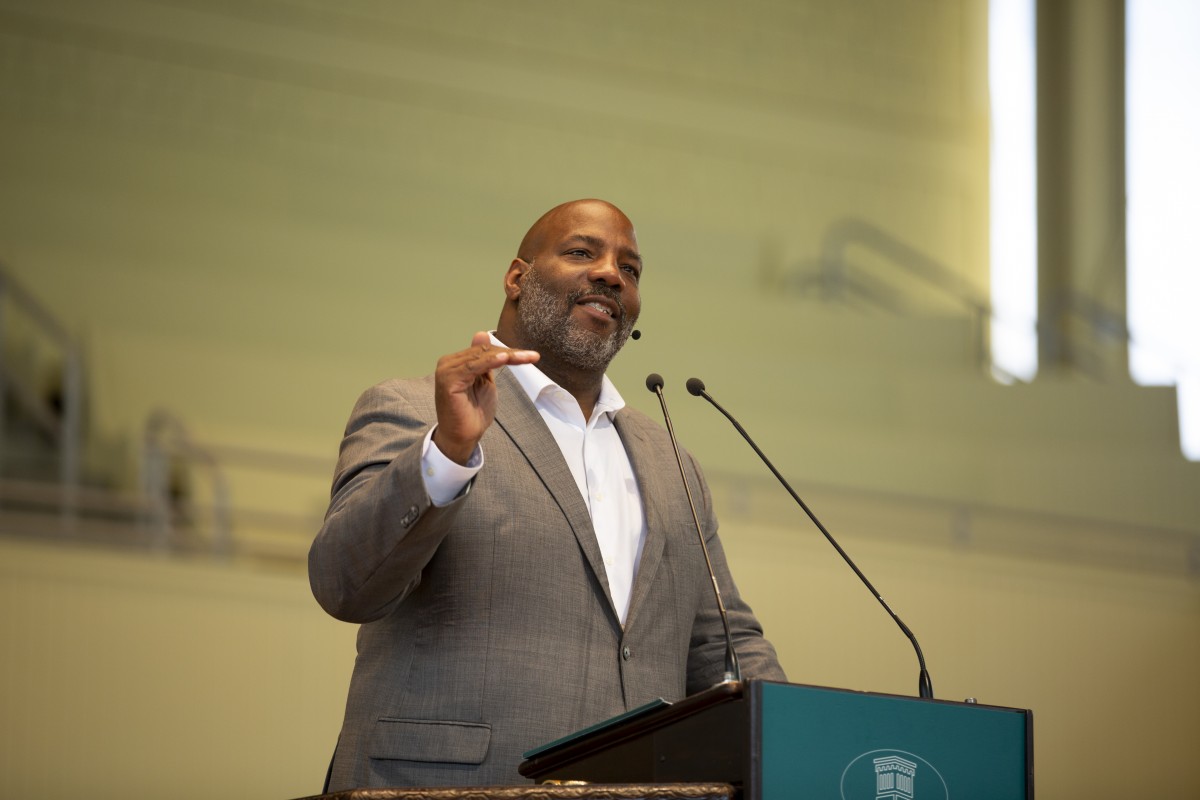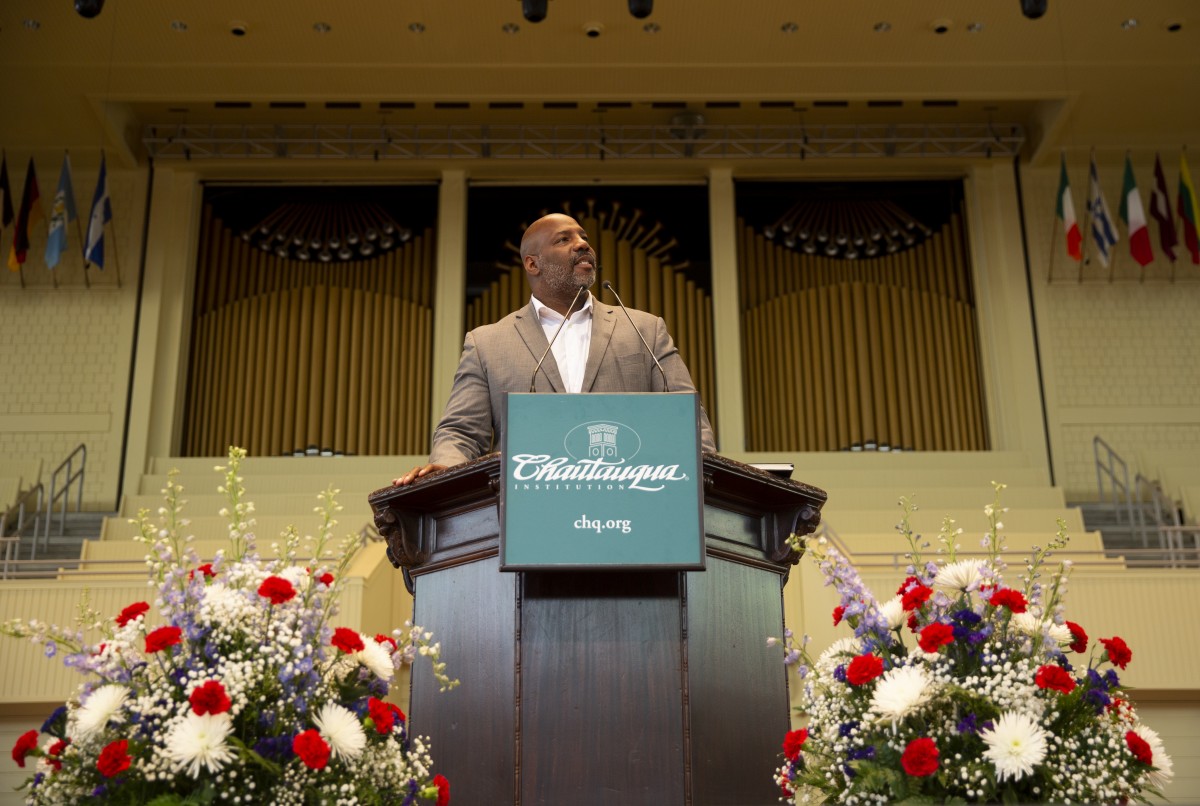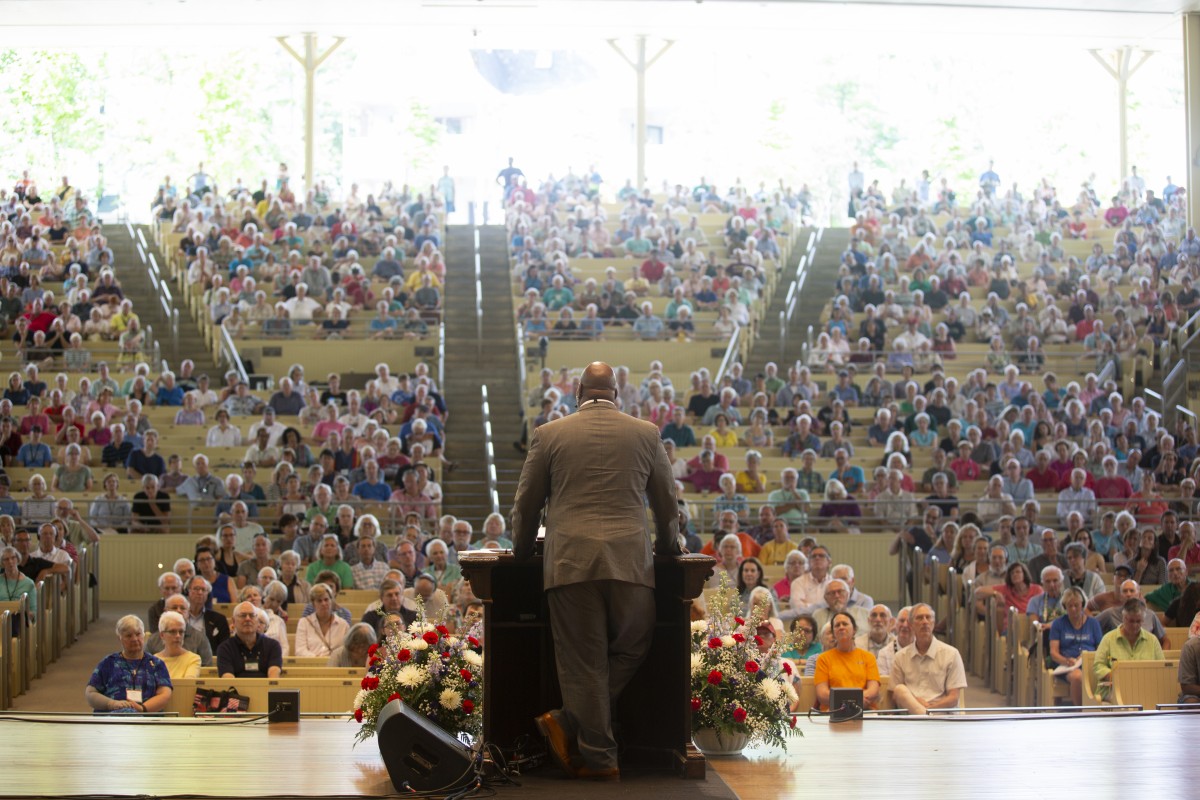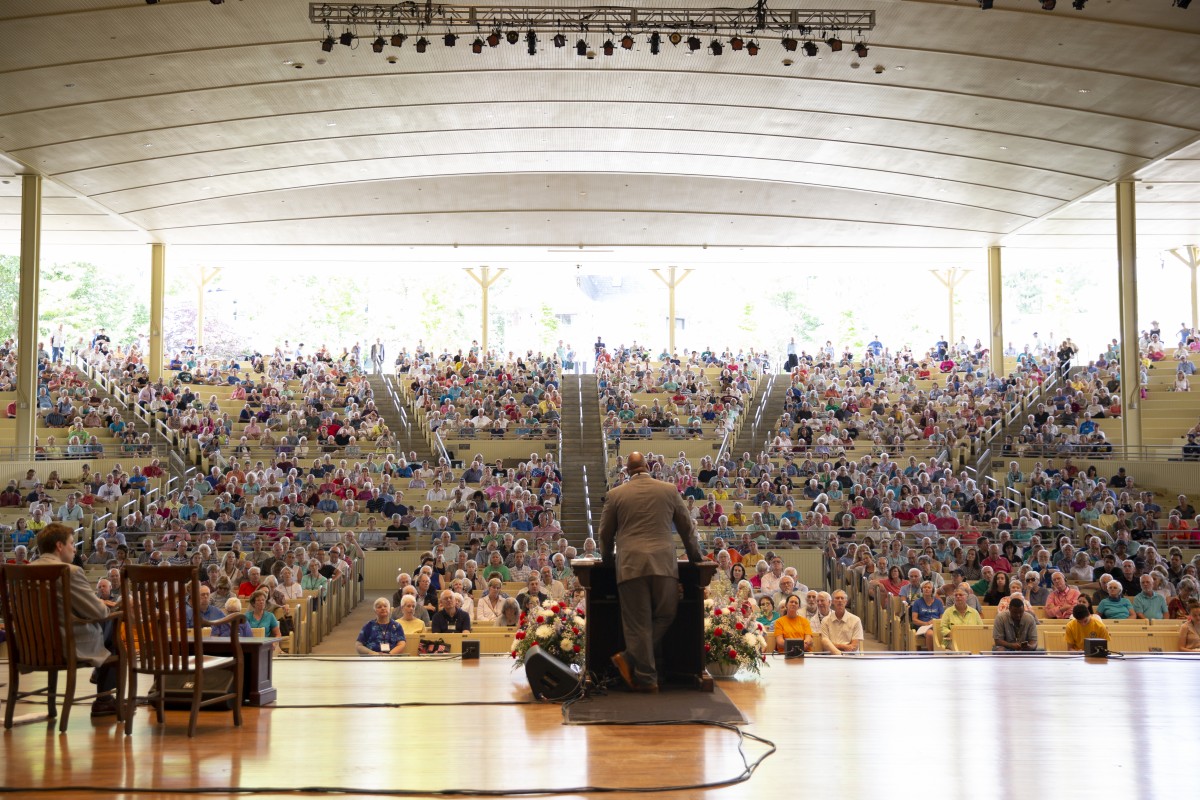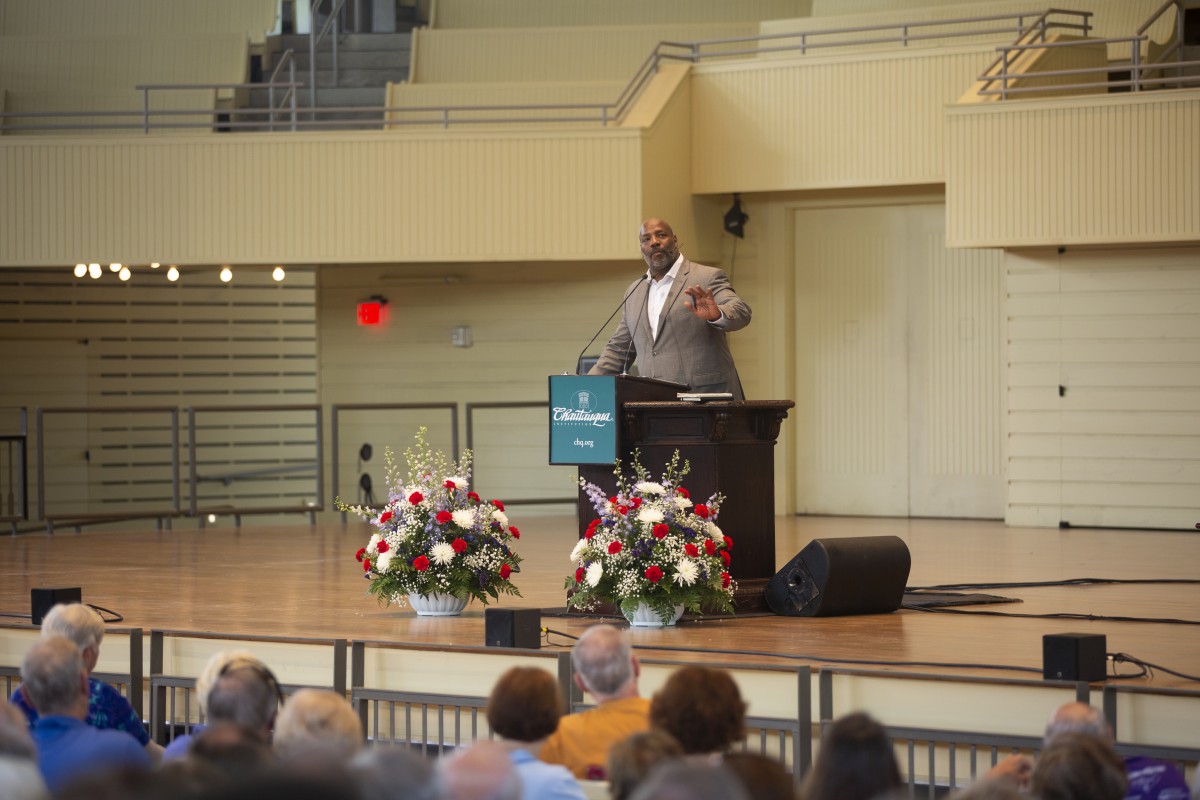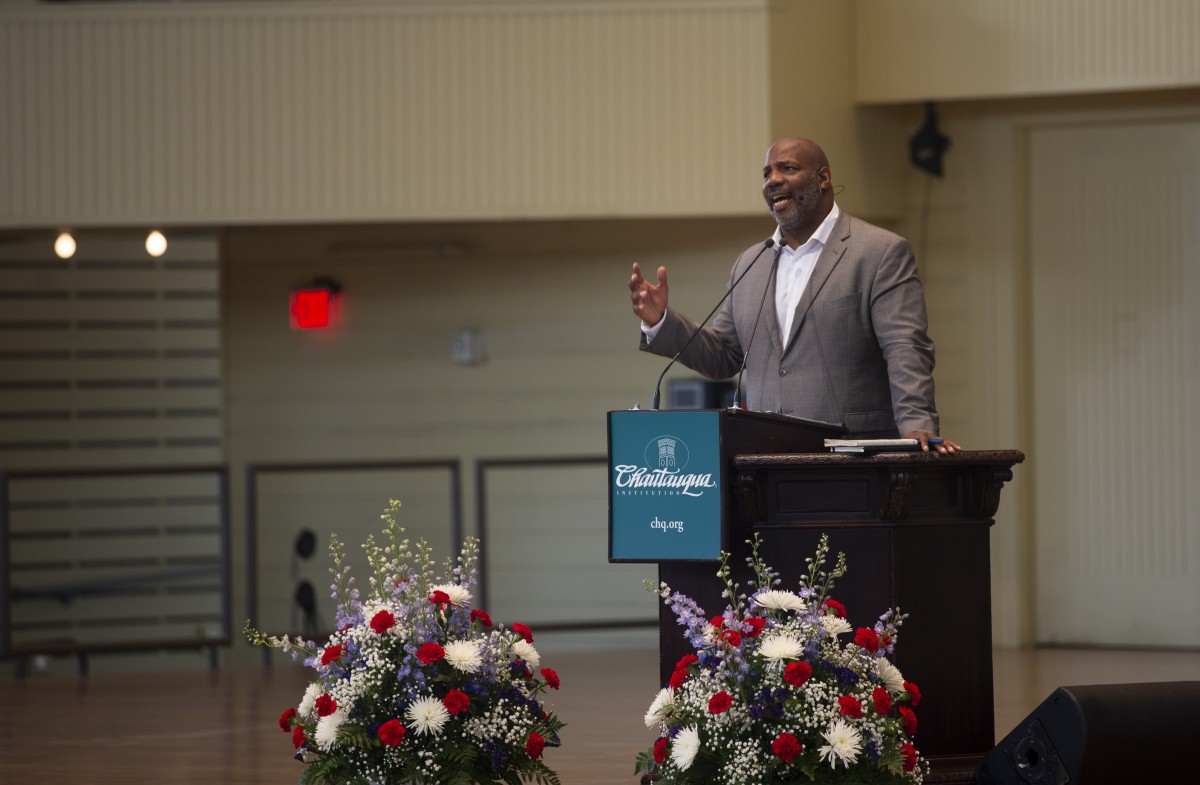Who are the “we” in “we the people?”
Jelani Cobb, staff writer for The New Yorker, took a hard look at what “we the people” has meant throughout history at the 10:45 a.m. morning lecture Tuesday, July 3 in the Amphitheater, continuing Week Two’s discussion of “American Identity.”
During Cobb’s tenure at The New Yorker, he has written extensively about race in America. His articles, including “The Anger in Ferguson,” “Murders in Charleston,” and “What We Talk About When We Talk About Reparations,” tackle injustice, the police and race.
He is the 2015 recipient of the Sidney Hillman Prize for Opinion & Analysis Journalism, the 2017 recipient of the Walter Bernstein Award from the Writers Guild of America East for his PBS Frontline series “Policing the Police,” and a Fulbright fellow.
This was his first visit to Chautauqua Institution.
“This is an immense country — sprawling — and if we were to ask ‘what America is,’ we could give any variety of answers,” Cobb said. “We could say that it is a nation-state, in North America — the North American continent — that covers 3.8 million square miles. That it has a population of 325 million people…”
Cobb rattled off facts about the U.S., from religious makeup to racial breakdown. He told the audience “a lot about the United States,” but not “who we are.”
“ ‘Who we are’ is a much broader, philosophical question,” he said. “It is best understood by our responses in times of difficulty. It is what we do in our most mundane moments. It is what we hold onto in our most cherished values.”
The question of who are “we the people,” Cobb said, is central to decades of unresolved conflict — he called it “the fundamental divide” — because for most of the nation’s history, “we” has been exclusive to white people.
“The first-person plural ‘we,’ we’ve never sufficiently understood and defined who was included in that word,” he said. “And as a consequence, we had a dynamic in American history of an expanding concept of ‘we’ and a contracting and fearful idea of who ‘we’ should be.”
This dynamic constantly replays itself, like a “Freudian nightmare, (recurring and recurring) until the underlying conflict is resolved,” he said.
Cobb referenced the Declaration of Independence — and its inherent hypocrisy.
In the original declaration, Thomas Jefferson drafted arguments for separating from England. One of the grievances stressed that the British were guilty of thrusting slaves on the American colonies, and if the slaves revolted, it would be at the expense of Americans, not the British, according to Cobb.
“This is as stinging a rebuke of the institution of slavery that we see from Jefferson’s pen,” he said.
That clause did not make it into the final draft, weaving oppression into the nation’s founding document.
“It is essentially copy-editing black freedom out of the original document. We begin with this disparity and distinction in the capacity in the word ‘we’ to not include all human beings of this country,” Cobb said.
Moving through history, this “disparity” pitted the young republic against itself, erupting in the Civil War — a war fundamentally rooted in the question of “who we are,” Cobb said.
Cobb, who lived in Georgia for a number of years, said “people will tell you ‘the Civil War was fought for a number of exotic reasons.’ ”
“It’s widely accepted that slavery was the active ingredient, which is to say it was not the only cause, but it was the cause which without it, we would not have war,” he said. “It was the intractable element in this, and this issue of slavery would prove more fundamentally as a question of identity.
“Could the people who imagined a republic where there had been none imagine an interracial republic where there was not one?”
States used slavery as a bargaining chip: California could join the Union if southern states could enact tighter fugitive slave laws. From these “compromises” arose a government bureau dedicated to capturing and returning fugitive slaves and attempts to impose a constitutional amendment to prohibit the abolition of slavery, according to Cobb.
None of this resolved the question of “who we are.”
“It’s like a tire that has been patched and patched and patched, and sooner or later the tire is going to fall apart,” he said.
Cobb recalled seeing a statue of Abraham Lincoln on the drive to the Institution. Most people remember Lincoln as “the Great Emancipator,” but Cobb said people admire him for the wrong reasons.
According to Cobb, Lincoln spoke openly about “(consigning) the Negro race to a position of inferiority.” It wasn’t until his party pushed for the abolition of slavery and the Union was victorious at the Battle of Antietam that Lincoln issued the Emancipation Proclamation.
Cobb noted that the proclamation only freed slaves in states that had seceded from the Union, and a constitutional amendment was needed to truly end slavery (only for those who had not been convicted of a crime).
“This is back to this expansion and contraction of ‘who is we?’ ” he said.
The rise of the Klu Klux Klan in the late 19th and early 20th century and the sharp increase of immigration laws were also bound in this question of “Who are we?”
Cobb jumped forward to contemporary history.
“In 2007, there were exactly four people in the United States who thought the country was ready to elect a black president, and they all lived in the same address on the south side of Chicago,” Cobb said over a roar of laughter. “But this happened, and it was an amazing thing to witness.”
He said regardless of political views or opinions, Barack Obama’s election to the highest office was a “novel development in American politics.”
However, the election of the first African-American president did not deter the “fundamental divide” from tearing at the social fabric of this new era.
A 2010 and 2011 opinion poll showed a small sliver of white people thought the most disadvantaged group in the country was themselves — despite making up 61 percent of the country and holding 91 percent of political offices, according to Cobb.
“We have yet to triumph over the most narrow sense — the most zero-sum understanding of who we are. We have yet to permanently inscribe a concept of democracy that sees itself as enriched with the presence and success of others. … This can be a difficult thing to grapple with,” he said.
But Cobb has hope. He shared an anecdote about a flight from Atlanta to New York City he took shortly after 9/11. A tall man with olive skin and a long beard boarded the plane wearing a tunic and baggy pants; he sat a row behind Cobb.
Cobb looked over his shoulder and asked the man where he was from; the plane fell silent.
The man turned and, in a rebuttal, asked Cobb where he was from. Cobb responded: “I’m from Queens, and I’m asking because I think you’re also from Queens, and if you are who I think you are, we were in the same breakdance crew in high school.”
“Everybody around us exhaled — he’s a breakdancer, he’s not going to kill us,” Cobb said over the audience’s laughter. “I’m now the large black man that made the white people around me feel more comfortable.”
This experience taught Cobb that it is possible for the country to see beyond its narrow view of itself and widely adopt openness and acceptance.
“In short, it is possible for democracy to exist in this land — it does not quite at this moment,” he said. “This struggle we have inherited from generations past, but I have no doubt that as people of conscience and diligence, it will. It will one day.”
After a thunderous standing ovation, Chief of Staff Matt Ewalt opened the Q-and-A by asking if Cobb finds confidence in the younger generation’s ability to further advance inclusivity.
“We do in instances find that young people are more open-minded about questions and being less mired by the decrepit thinking of older generations, and I think that’s hopeful,” Cobb said. “But I also think that we can’t kind of think that we are on auto-pilot, that these issues will resolve themselves.”
One attendee asked Cobb’s thoughts on whether Colin Kaepernick’s decision to kneel for the national anthem is a response to social injustices, or a lack of patriotism.
Cobb, who is close friends with Kaepernick, said that people mistake his decision as “unpatriotic” to gloss over the actual issues at hand, like police brutality.
“Patriotism is supposed to include dissent,” Cobb said.


